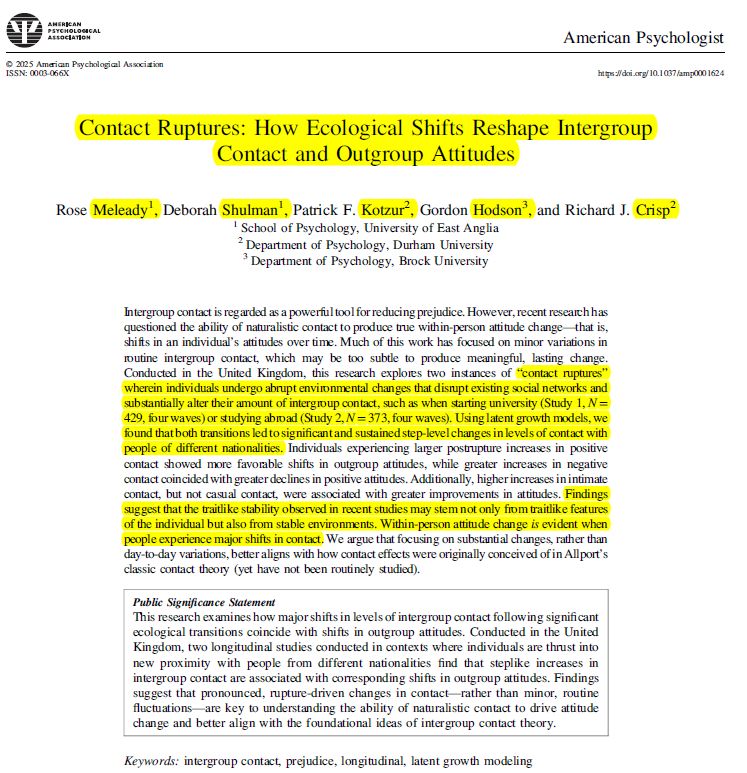
Studying how to reduce prejudice and discrimination.
Opinions are my own. he/him
calvinklai.com
I'm chairing the search committee and am happy to field questions about the position. 🧵
spsp.org/news/charact...
spsp.org/news/charact...
This does *not*, however, mean that you won't get a good job if you don't go to a "top 20" program.
(1/3)

This does *not*, however, mean that you won't get a good job if you don't go to a "top 20" program.
(1/3)
"The Consequences of Faculty Sexual Misconduct"
Sarah Cohodes & Katherine Leu

"The Consequences of Faculty Sexual Misconduct"
Sarah Cohodes & Katherine Leu
Our new meta-analysis finds robust evidence of moral contagion (N=4,821,006)
The moral contagion effect is even stronger in larger, pre-registered studies (17%).
academic.oup.com/pnasnexus/ar...

Our new meta-analysis finds robust evidence of moral contagion (N=4,821,006)
The moral contagion effect is even stronger in larger, pre-registered studies (17%).
academic.oup.com/pnasnexus/ar...

I’ll start:
The editorial decision to accept Bem’s precognition paper at JPSP.

I’ll start:
The editorial decision to accept Bem’s precognition paper at JPSP.

predicted from digital footprints, and personality‐tailored messages show negligible effects on behavior... When design and evaluation flaws are controlled, the combined end‐to‐end effectiveness of psychological targeting approaches zero."

predicted from digital footprints, and personality‐tailored messages show negligible effects on behavior... When design and evaluation flaws are controlled, the combined end‐to‐end effectiveness of psychological targeting approaches zero."
1/4
1/4
Willful ignorance is also motivated by social identity concerns--it is driven by ingroup favoritism + outgroup derogation and fuels conspiracy belies.
www.sciencedirect.com/science/arti...

Willful ignorance is also motivated by social identity concerns--it is driven by ingroup favoritism + outgroup derogation and fuels conspiracy belies.
www.sciencedirect.com/science/arti...
youtu.be/PK_BQjVHZ00?...

youtu.be/PK_BQjVHZ00?...

Only 50% of findings replicated
Hypotheses based on differences between social class contexts in terms of constraints, uncertainty & status were supported:
www.nature.com/articles/s41...

Only 50% of findings replicated
Hypotheses based on differences between social class contexts in terms of constraints, uncertainty & status were supported:
www.nature.com/articles/s41...
I met her 10+ years ago as a grad student @uvapsychology.bsky.social. She believed in me at my lowest and inspired me to persevere through the challenges of grad school + life.
I met her 10+ years ago as a grad student @uvapsychology.bsky.social. She believed in me at my lowest and inspired me to persevere through the challenges of grad school + life.


“Why Washington University must not sign Trump's 'compact'”

“Why Washington University must not sign Trump's 'compact'”
ungated: osf.io/preprints/so...


ungated: osf.io/preprints/so...
We merged a light touch intervention (typical of survey experiments) w/ an intensive intervention (more typical of practitioner efforts) for reducing toxic polarization to see if we could cheaply boost 🚀 the more intensive intervention


We merged a light touch intervention (typical of survey experiments) w/ an intensive intervention (more typical of practitioner efforts) for reducing toxic polarization to see if we could cheaply boost 🚀 the more intensive intervention
Our new paper out in American Psychologist.
Led by Meleady, with @debshulman.bsky.social, Kotzur, & Crisp.
Contact "ruptures" (going to university; studying abroad) ==> changes in outgroup attitudes longitudinally
psycnet.apa.org/doiLanding?d...

Our new paper out in American Psychologist.
Led by Meleady, with @debshulman.bsky.social, Kotzur, & Crisp.
Contact "ruptures" (going to university; studying abroad) ==> changes in outgroup attitudes longitudinally
psycnet.apa.org/doiLanding?d...
Our paper, FirstView at @politicalanalysis.bsky.social, tackles this question using browsing data from three U.S. samples (Facebook, YouGov, and Lucid):

Our paper, FirstView at @politicalanalysis.bsky.social, tackles this question using browsing data from three U.S. samples (Facebook, YouGov, and Lucid):

(The entire article is required reading, but I especially appreciate this section)

(The entire article is required reading, but I especially appreciate this section)

